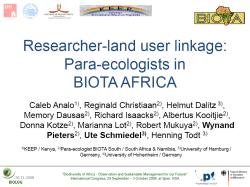|
|
|
 |
|
|
Presentation
< back to presentation overview
| Details of the presentation |
| Presentation |
Oral presentation |
| Title |
Researcher-land user linkage: The para-ecologists in BIOTA AFRICA
|
| PDF Download |
 Download PDF (Filesize 2.8 MB)
Download PDF (Filesize 2.8 MB)

|
| Short title |
Para-ecologists
|
| Author(s) |
Schmiedel, U.(1); Christiaan, R.(2); Dausas, M.(2); Isaacks, R.(2); Kooitjie, A.(2); Kotze, D.(2); Lot, J.(2); Mukuya, R.(2); Pieters, W.(2); Todt, H.(3); Dalitz, H.(3); Analo, C.(4)
|
| Presenting author |
Schmiedel, U. (1); Pieters, W. (2)
|
| Institution(s) |
(1) Biocentre Klein Flottbek, University of Hamburg; (2) Para-ecologist BIOTA Southern Africa; (3) Institute of Botany and Botanical Garden, University of Hohenheim; (4) Kakamega Environmental Education Programme (KEEP), Kakamega
|
| Keywords |
Non-academic capacity development; knowledge exchange; empowerment; awareness raising;
|
| Abstract |
Applied biodiversity research which aims to provide knowledge and information for improved land use and biodiversity management requires strong interaction and exchange between scientists and local stakeholders. The farmer’s knowledge is needed for a sound scientific understanding of the ecosystems and of the land management systems. However, farmers, the most important group of local stakeholders in the context of BIOTA’s research, and researchers often seem to have different perceptions of biodiversity and natural resources. While many scientists lack capacity for fruitful knowledge exchange with non-scientists, farmers are often not familiar with the objectives, approaches and the results of academic research. And, due to historical developments and the socio-economic circumstances, local stakeholders may have a more short term perspective for their survival. These are the challenges applied biodiversity research has to cope with.
Based on this understanding, BIOTA AFRICA initiated training programs for members of local land user communities as para-ecologists who facilitate the knowledge exchange between scientists and local land users. The para-ecologists support the research and monitoring activities within BIOTA and develop their capacities during special training courses and on the job.
The talk will give an introduction into the BIOTA para-ecologist programs in Southern Africa (South Africa and Namibia) and Kenya (in collaboration with the NGO KEEP). The benefits and challenges will be presented from the perspective of the scientists, the para-ecologists and the land user communities.
Finally, we will discuss the future perspectives for the para-ecologists who worked for many years in the context of BIOTA and with that developed important capacity and skills in the field of biodiversity research, monitoring and management.
|
| Congress Topic |
Capacity development
|
| Topic No. |
5.4 |
| Notes |
---
|
| Ref. No. |
600 |
|
|
|
